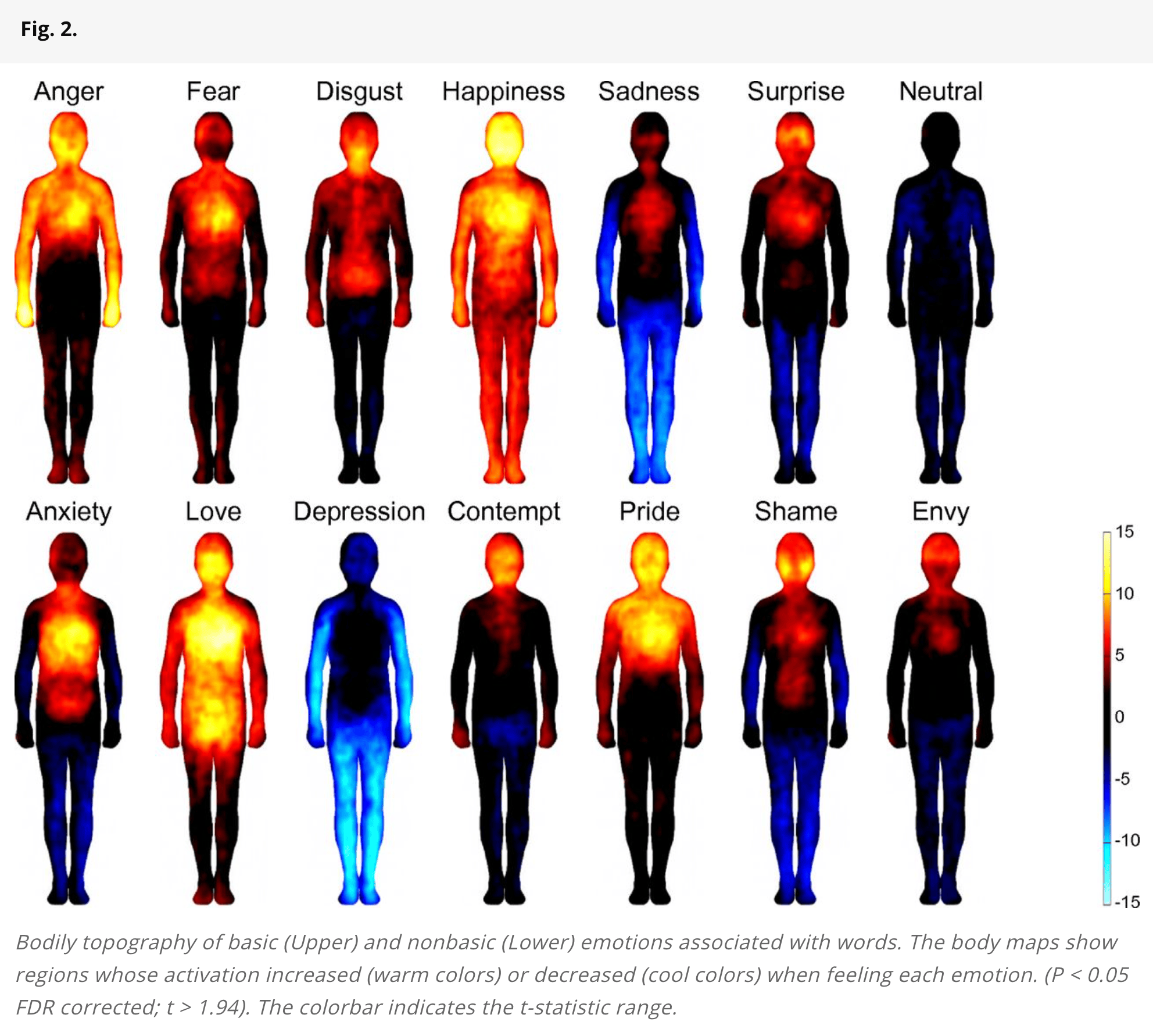An old saying goes, “The spirit is the life, the mind is the builder, and the physical is the result.” Nothing happens in our physical world without our minds thinking, processing, and applying the information first. This connection between the mind and the body and its strength plays a massive part in bettering our health and lives.
But what about our emotions? How do they fit in? Do our emotions influence our physical health? Do they affect our mind-body connection?
Estimated reading: 8 minutes
 Heartmanity is proud to partner with outstanding companies that we wholeheartedly recommend so this post may contain affiliate links. This means if you click on a link and purchase something, we will receive a commission at no extra cost to you. Thank you for supporting Heartmanity's mission!
Heartmanity is proud to partner with outstanding companies that we wholeheartedly recommend so this post may contain affiliate links. This means if you click on a link and purchase something, we will receive a commission at no extra cost to you. Thank you for supporting Heartmanity's mission!
Having robust emotional health today is more important than ever. We are constantly being pulled in a hundred different directions at once, with more and more responsibility. We need to be emotionally healthy to handle the pressures we face daily. To put it another way, we need to be emotionally intelligent.
In our never-ending pursuit of optimal health (mental, emotional, and physical), the mind-body connection is often overlooked and underestimated. It’s the cornerstone of our emotional health and overall well-being.
Let’s look at the science of the mind-body connection and how our mental states and physical health are interconnected and interdependent.
Use this article as a practical guide to understand and harness the power of the mind-body connection. This critical connection bridges the gap between emotional and physical wellness and is a direct route to achieving optimal health.
What Is Emotional Health?
Emotional health is a significant part of optimal physical and mental health. It refers to how you’re feeling emotionally. Are you filled with emotional turbulence? Or can you manage, regulate, and express your emotions that arise from the challenges and experiences of daily life with ease? It’s not about being happy all the time; it’s knowing we can confidently handle what life throws at us with resilience.
Therefore, having emotional health doesn't imply the absence of negative emotions like sadness or anger. Instead, we have the ability to feel fully and handle these emotions effectively.
Examples of Emotional Health
Here’s what being emotionally healthy looks like:-
Having Awareness of Emotions:
Recognizing your own emotions and their effects. It involves understanding the source of your emotions and recognizing how they impact your thoughts and behaviors. -
Ability to Process Emotions:
Effectively managing a wide range of feelings and varying intensities, including the ability to express emotions in a healthy manner and process complex feelings without being overwhelmed. -
Resilience:
The capacity to recover quickly from difficulties. Emotionally intelligent people can bounce back from setbacks, stress, and hard knocks. -
Empathy and Social Skills:
Understanding and being sensitive to the emotions of others and having loving and respectful interactions and relationships. Empathy is a key skill in relationships. -
Self-Regulation:
The ability to control, modulate, and adapt your emotional responses in different situations. This skill includes managing stress effectively to stay calm and focused under pressure. -
Positive Outlook:
Maintaining a generally optimistic perspective; you can enjoy life and appreciate the small things despite their ups and downs. -
Self-Care:
Engaging in activities that promote emotional wellness, such as exercise, mindfulness, relaxation techniques, and hobbies. Occasionally seeking support from friends, family, or professionals when needed. Self-care is foundational to a healthy life.
Your emotional health and physical health are intrinsically linked. Imagine if you didn’t have any of the above characteristics. You wouldn’t feel very good physically either, would you?
Emotional stress can lead to health problems. If you are going through a divorce or having problems at work, the stress affects your body. Perhaps, your sleep takes a hit, or your immune system is strained, or you might develop stomach problems.
Conversely, physical ailments can affect your emotional state. If you’re sick and tired, feelings of happiness are less likely.
Improving or maintaining emotional health is a continuous process. It involves developing a deeper understanding of oneself, cultivating a supportive social network, and adopting healthy lifestyle choices. One of the more essential choices is improving the mind-body connection.
Imagine if you weren’t just answering questions and solving problems. Treating people with care and understanding—that’s the secret sauce. It’s not about selling stuff or fixing problems; it’s about making a friend on the other end of that call.
Understanding the Mind-Body Connection
Let’s get a general understanding of what the mind-body connection is and how it works.
The mind-body connection is a simple concept: there is a profound link between our thoughts, emotions, and physical health. It’s the idea that our mental and emotional states directly influence our physical well-being and vice versa.
How Negative Emotions Adversely Affect the Body
Take chronic stress, for example: according to the Mayo Clinic, the body's natural response to stress involves a surge of hormones such as adrenaline and cortisol. These hormones increase heart rate, blood pressure, and energy levels. They also affect immune responses and suppress systems like digestion and reproduction.Extended elevated stress levels and prolonged exposure to these stress hormones will disrupt almost all body of your body’s functions, leading to an array of health problems. These issues can include psychological challenges like anxiety and depression or manifest as physical conditions such as high blood pressure, digestive problems, and muscle tension.
Beyond the physical, emotions affect our psychological health as well. Sticking with the anxiety and stress example, these negative emotions can also impair our cognitive functions, making work and home life more challenging. Research from PubMed shows that high or chronic stress impairs the hippocampus and prefrontal cortex, which are responsible for explicit memory formation and performing complex reasoning tasks.
However, the reverse is also true regarding negative emotions having a negative effect.
Related reading: "5 Steps to Reset Your Emotions and Find Inner Peace."
How Positive Emotions Improve the Body’s Functions
Research shows that positive emotions, such as happiness and contentment, are linked to lower blood pressure, reduced risk of heart disease, healthier weight, better blood sugar levels, and potentially longer life.
When your thoughts and emotions are low-stress or stress-free, your blood (which carries oxygen, nutrients, and hormones) can flow more efficiently, improving physical health, cognitive function, and overall well-being.
Put simply, when your emotions and mind are healthy, your body and mind function better.
Related reading: "How to Improve Emotional Intelligence in Everyday Life and Relationships."
The Brain and Body Integration: What We Know
While it may seem straightforward how emotions affect the body and vice versa (e.g., if you see something scary, your heart rate and breathing increase), it’s more challenging to understand how and why. The human brain is by far the most complex part of the human body—maybe the universe—and scientists continue to seek to understand exactly how our body, brain, and emotions all function together.
Initial Theories
One commonality of all emotions is that they cause changes to your brain activity, how you function, and your behavior. Here are two of the most well-known theories about how your brain and body process emotion.
The first is the 19th-century James-Lange Theory. It states that physical changes inside the body cause emotions, and how we feel those emotions is our brain detecting them. For example, if you walk in the woods and encounter a cougar, your palms will start to sweat, your muscles will tense, and your heart rate will increase. Your brain then interprets this as fear.
The second theory is from the first half of the 20th century and is called the Cannon-Bard Theory. It says the body change and emotion occur simultaneously, not that one causes the other.
Today’s Opinion
Modern brain-body communication theories recognize that there is more cross-talk between the two than initially thought. An idea called “top-down and bottom-up control” is used to understand brain-body connections better.
Top-down control refers to the brain sending signals to organs and muscles to regulate their functions. Bottom-up processing involves how changes in the body can alter brain activity and subsequently affect emotions and behaviors.
While nothing is concrete, studies today increasingly show that these bidirectional interactions between the brain and body positively affect our emotional and physical health.
As I mentioned, our brains are incredibly complex, and research is ongoing to figure out exactly how the brain and body integration works. Increasing brain fitness will assist in boosting the mind-body connection.
How Emotions Can Manifest Physically
Emotions are not just fleeting feelings; they manifest physically in our bodies in profound ways.
According to Lauri Nummenmaa, a molecular neuroscientist who leads the Human Emotion Systems lab at Turku PET Centre in Finland, the brain has dedicated circuits called interoceptors, which continuously track and respond to the body’s state. The insular cortex controls this communication and acts as a data center for bodily sensations and emotional responses.
She and her team’s study of bodily maps of emotions is one of the most definitive arguments for why your emotional health depends on the body-mind connection.
Nummenmaa sought to understand better how emotions affect our bodies. Here’s what she did: Participants were asked to report where they felt physical sensations when exposed to six “basic” and seven nonbasic (“complex”) emotions, as well as a neutral state, all described by the corresponding emotion words.
Check out her findings:
Source: Nummenmaa, L., Glerean, E., Hari, R., & Hietanen, J. K. (2014). Bodily maps of emotions. Proceedings of the National Academy of Sciences, 111(2), 646-651.
As you can see from the picture above, different emotions prompt unique physical responses. Anger activates the heart and slows digestion, an evolutionary response for protection and readiness. Other negative emotions are also mostly confined to specific areas, causing physical pain or discomfort.
Happiness, however, triggers positive, warming sensations across the entire body, reflecting overall well-being. And then there’s depression, which puts the body in an energy-conserving mode, reducing activity and, therefore, your overall health.
This link between emotions and physical health also influences chronic conditions. Unpublished research by Nummenmaa shows connections between emotions and chronic or acute pain. Anger might cause lower back tension, fear could affect digestion, and excessive stress might lead to neck and shoulder tension. These emotional states keep muscles tense, potentially leading to chronic pain like tension headaches.
Let’s look at another landmark body of work.
Candace Pert’s Insights: The Science Linking Emotional and Physical Health
We can also look to renowned neuroscientist Candace Pert's groundbreaking book Molecules of Emotion to better understand why emotional health is so deeply intertwined with physical health and the body-mind connection. Here’s a quick breakdown of her findings.
-
The Role of Neuropeptides in Emotions:
Neuropeptides, small protein-like molecules, carry emotions throughout the body and are their biochemical substrates. This discovery proved that our emotions extend beyond the brain to the rest of our bodies. -
Emotions as Physical Entities:
By proving the link between emotional states and health through her neuropeptide research, Pert’s work underscores the importance of a holistic approach to optimal health and well-being. This research means that managing stress, having positive emotional experiences, and improving our mental and emotional health do not just affect us psychologically but are integral to our physical health.
Pert’s research challenged the long-held belief that emotions existed only in the mental state. Her work is a cornerstone for understanding why emotional health is essential for a better body-mind connection, emphasizing the need for a holistic (whole-body, inside and out) approach to finding optimal health.
So, as you can see from the research, our emotions and emotional health profoundly affect our bodies. But is the opposite true, too?
Does Our Physical Body Affect Our Emotions?
There is a link between mental and physical health, even though the actual pathways are less clear and still being studied. However, one study analyzing data from over 10,000 individuals found that past physical health impacts present mental health and vice versa. It also found that physical activity, a vital aspect of physical fitness, significantly contributed to the subjects' emotions.
This study indicates that not only do our emotional states impact our physical well-being, but our physical health also plays a crucial role in shaping our mental and emotional states.
Undoubtedly, emotional health is linked to a solid body-mind connection, and vice versa, and is essential to optimal overall health. If we can strengthen our mind-body connection, better manage our thoughts, and become healthier emotionally, our physical health will improve simultaneously, helping us get closer to optimal health.
So how can we help ourselves improve this essential body-mind link and lead a longer, happier, healthier life?
Related reading: "How Interior Design Can Improve Your Mental Wellness."
Practices for Enhancing Mind-Body Connection
Now that we know how vital the mind-body connection is and how big emotional health’s role is, let’s give you some practical ways to strengthen it.
Yoga, Tai Chi Chuan, and Qigong
These three centuries-old practices can help you with mindfulness and focusing on your inner energy and the present moment. The movements are slow and steady, emphasizing breathing and moving energy from the mind throughout the body.
Mind-body disciplines like these aim to balance and regulate the stress response system. They also enhance prefrontal cortex activity, reduce amygdala activity, and normalize the hypothalamic-pituitary-adrenal (HPA) axis and locus coeruleus-sympathetic nervous system functions.
Mindfulness
Practicing mindfulness is an excellent way to lower stress and anxiety because it requires focusing on the present and acknowledging your internal feelings and cues. One of the best ways to improve your health is to observe, identify, listen to, and act on what is “off” in your body and mind. Mindfulness practices assist us to observe and pay attention.
People suffering from anxiety, depression, and chronic stress are often characterized as “over-thinkers” and too frequently think about the past or future, which can exacerbate their condition. Techniques that encourage relaxation, such as meditation, calm the mind, bring attention to the present moment, and slow the thought process. They can significantly alleviate feelings of anxiety, depression, and anger, which improve your emotional health.
Biofeedback
The first two practices are “old school.” Now, let’s look at how technology can help improve your body-mind connection with a pioneering technique called biofeedback.
Biofeedback uses scientific and physiological monitoring to increase awareness of the body's states. One use is electromyography (EMG), which helps individuals recognize and adjust their body's responses, contributing to a deeper understanding and control over physical health.
Apollo Wearable
A recent technology developed by a team of physicians and neuroscientists at Apollo Neuro believes the Apollo Wearable lowers stress. Clinical trials show that it balances and strengthens our autonomic nervous system, and over time, our body learns to build resilience to stress and recover more rapidly. The studies show a reduction of 40% in stress while increasing focus by 25% and improving sleep!
The app sends gentle vibrations to your Apollo device, which subtly nudges your body to feel more at ease—an excellent use of modern technology! Check it out.
Natural Ways to Strengthen the Mind-Body Connection
Of course, don't underestimate the power of sleep, diet, and exercise. These basics are all excellent ways to increase your emotional health and body-mind connection.
Proper nutrition, a good night’s sleep, and exercise can tremendously impact your mental health and the mind-body connection.
More sleep means you will be better rested, less stressed, and sharper to tackle the day’s challenges. Proper nutrition gives your body fuel for energy and to fend off disease and illness. And exercise strengthens muscles, bones, and your immune system—and releases endorphins that make you happier.
Related reading: "25 Ways to Live Healthy with Ayurvedic Principles."
Closing Thoughts
The main takeaway here is that a strong body-mind connection and robust emotional health are not just connected but are dependent and interdependent.
We have explored this connection's science and real-life implications, revealing how our emotions can manifest themselves physically and how our bodies can influence our mental state and emotions.
Integrating practices to better your mental and physical health isn’t just my recommendation to live a healthier, happier life; it’s vital!
Embracing practices like yoga, gentle stretching, and mindfulness alongside basics like wholesome sleep, diet, and exercise, can significantly enhance this connection. These methods improve our physical health and enhance our emotional resilience.
As you continue on your path to wellness, remember that the key to optimal health is nurturing your emotional intelligence and physical well-being. This integrated, holistic approach leads to a healthier body-mind connection and a foundation for lasting happiness and fulfillment.
For personalized support, reach out to Heartmanity! Email us at support@heartmanity.com for emotional fitness coaching and more on how to boost the mind-body connection!








